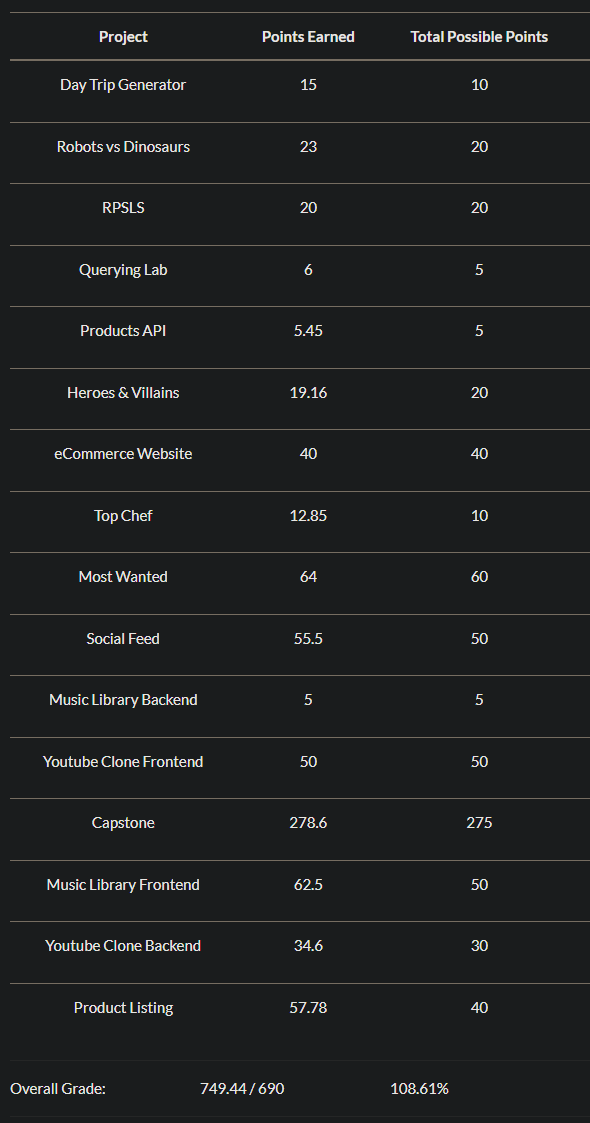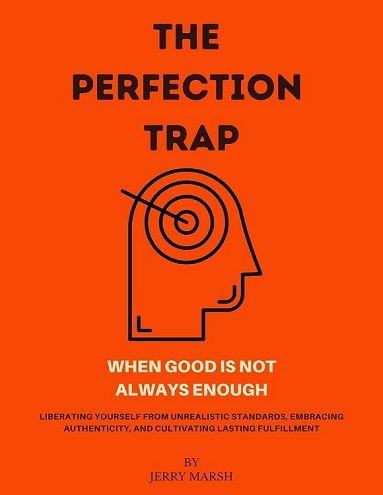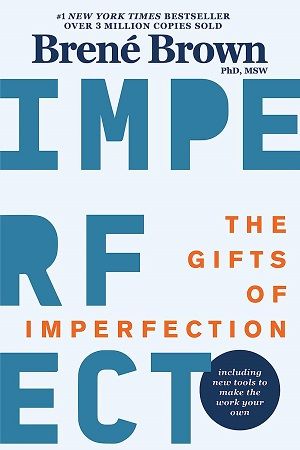Perfectionism
Here’s a quick test. Imagine you’ve taken a class, and you've received the grades below. You need 80% overall to pass. What catches your attention?

If you’re sensible, the answer is that percentage at the bottom. Well done, you passed by a mile.
As it happens, those are my grades. What’s the thing that catches my attention? The sixth project down, Heroes & Villains, where I only got 96%. That feels like a bit of a failure to me.
I’ve known for a while that looking at the world that way isn’t helpful, but until the last few weeks, I didn’t realize it was actively unhelpful. In that time, I read the three books I’ll talk about here, and started listening to Ross Lepalla’s Project UnchainED podcast. They’ve helped me realize how much needless anxiety I’ve been causing myself, and though it’s early days in dealing with it, even just recognizing that has helped immensely.
The Perfection Trap - Jerry Marsh

I have mixed feelings about this book. It certainly has some good sections; sections that helped me recognize perfectionism was a problem for me. It also has some blatant failings.
The quote that hit most directly for me was “Rather than embracing mistakes as opportunities for growth, perfectionism casts them as evidence of inadequacy. Consider a student striving for perfect grades. In the realm of perfectionism, any grade less than flawless is seen as a personal failure.”
That is 100% true. I finished my neuroscience degree last year, and I ended up with a 3.94. I had absolutely zero reason, none at all, to aim for a 4.0. I’m not even planning on using the degree for anything job-related; I was just curious, and I was lucky enough to be in the position where the government would pay me to go to college (again), so I indulged myself. But the amount of needless stress I held myself under in order to maintain perfect grades was immense, until my then-girlfriend/now-wife could convince me it was okay to let it go. That was an exceptionally hard thing to do, despite acknowledging the logic of it. I had other areas that would benefit more from my attention, but that attention was wrapped up in a pointless goal I'd set myself.
It did have sections like that: that’s the good part. The bad part is, I suspect the book was just churned out in order to capitalize on less than careful people’s mistakes (more on that in a second), rather than to actually provide value. The most egregious example, and the one that makes me think it was given some basic prompts and then written mostly or entirely by AI, comes near the end. “In the upcoming chapters, we dive even deeper into the realms of navigating social media and confronting societal pressures.” That’s on the last page, before a short conclusion. There are no upcoming chapters after that.
Overall, 2/5. Solid insight at some points, but it was extremely repetitious, saying the same things over and over in slightly changed wording, and it did not deliver on its promises. Everything good in this book is better found in the next book.
The Perfection Trap - Thomas Curran

You may notice a similarity here, and this is what I meant above about not being careful. This is the book I meant to read, after listening to an interview with the author on the Freakonomics podcast. This was released on 8 August 23, and in what I’m sure is a complete coincidence, a much sloppier book with the same main title was released two days later, on 10 August 23. But enough sarcasm, on with the review.
The main thrust of the book, and of the podcast episode, is that perfectionism isn’t about having high standards, but about nothing being enough. Someone with high standards receives a 108% in a course and realizes they did a good job. A perfectionist looks at it, looks past the assignments that got 144%, and sees the one that got 96%, the one that could’ve been better.
“Procrastination is often portrayed as a time-management problem, but in actual fact, it's an anxiety-management problem.” This nailed it. I've known for years that I’ve got a procrastination problem, and I’ve tried all sorts of systems to address it. Almost all of them have had some value, but none of them really fixed much. For the most part, they just let me see all the tasks I wasn’t doing in fancy new ways.
When I listened to this section, however, it was a lightbulb moment. I love coding, but when I started doing it for this course, I found myself avoiding it until it became critical. At that point, I would manage to put out an objectively excellent product, but with far more stress in the process than was needed. Looking at it through the lens of anxiety, however, it’s obvious that I wasn’t going to want to do it if I felt like a 96% was failure. Facing inevitable failure is daunting.
It’s often argued that perfectionism has its costs, but also its benefits, and that the main benefit is higher quality work and more productivity. However, a study by Brian Swider et al. found that this is not the case. “We did find consistent, modestly-sized relationships between perfectionism and variables widely considered to be beneficial for employees and organizations (i.e., motivation and conscientiousness). Yet critically, we found no link between perfectionism and performance.”
This has certainly been the case for me. It’s only been about a week since I realized I can just drop those expectations, but I’ve been getting a lot more done (writing my first article since July, for instance) and my stress levels have plummeted. The negative feelings from measuring myself against impossible standards were not driving me to do my best, they were driving me to avoid doing anything. I wasn’t chasing excellence, I was just avoiding failure, and those are two very different things.
I give this book 5/5.
The Gifts of Imperfection - Brené Brown

Aside from the first book, which… lacked rigor, almost everything else I’ve read or listened to on the topic of perfectionism has referenced Dr. Brown’s work. She focuses a lot on self-talk, which is an area where I’ve recently realized I have a lot of room for improvement. I am an exceptionally verbal thinker, and have an internal dialogue going in my head almost all the time. As such, self-talk is something I need to spend more time researching, and this was an excellent place to start.
“How many of us are quick to think, ‘God, I’m so stupid’ and ‘Man, I’m such an idiot?’ Just like calling someone we love stupid or an idiot would be incongruent with practicing love, talking like that to ourselves takes a serious toll on our self-love.”
Talk to yourself the way you’d Talk to a Friend is great advice. In particular, it’s great advice I’ve heard many times and implemented zero times until recently. Between The Perfection Trap and this book, I finally realized that I don’t need to have the harsh self-judgements to motivate me. “Wow, you sucked at that” may work as motivation occasionally, but far more often, it’s just motivation to avoid trying and failing again.
I did disagree with her on one point though. Well, not so much disagree as find inapplicable in my particular circumstance. “Where perfectionism exists, shame is always lurking. In fact, shame is the birthplace of perfectionism.” This doesn’t land for me. Don’t get me wrong, I do have things I’m ashamed of, but they’re generally unrelated to perfectionism. I’m ashamed of the times I’ve needlessly hurt people. I’m ashamed of the times I didn’t live up to my values. But I’m not ashamed of getting 96% on that assignment. It just bugs me. I’m under no impression that 96% is an objectively bad grade; I’m simply neurotic (and almost certainly autistic, which is another thing that I didn’t realize until the last year or two, but is incredibly obvious once I started looking). That's something I can and will work on, but so far as I can tell, it's unrelated to shame.
All around, great book. I give it 4.5/5. It falls short of 5/5 not due to any failing in the book itself, but because it didn’t quite line up with me personally.
Project UnchainED - Ross Lepalla
I started listening to this podcast when it was initially released at the end of 2020, but it wasn’t for me at the time. I was a bit put off by some of the woo-ier language, and it wasn’t landing in a useful place. Last week, I gave it another try, and I’m currently on episode 42 of 74.
I’ve changed since then, and I’m more able to look past surface disagreements to the core of the message. I can see now that despite using words like “synchronicity”, which is usually a red flag for magical thinking, Ross isn’t counting on anything supernatural happening. So far as I can see, it’s just his way of saying that, when you’re clear about your goals, suddenly opportunities you didn’t see before start appearing. Not because you’ve connected with the universe and it’s mystically providing you what you believe in, but because your clarity of mind opens you up to see things you wouldn’t otherwise notice.
So far, episode 18, with his own life coach, Mim Chapman, has been my favorite episode. (I just started the episode with Mike Tuchscherer, though, so that may change later today.)
If you’ve interacted with Ross at all, you probably know he’s a genuinely good guy. He’s insightful, and this isn’t by chance, but due to a lot of purposeful self-work and healing. He’s exceptionally open about his journey from being a suicidal teenager to being in the good place he currently inhabits, where he can embrace life whole-heartedly.
I can't rate this like the books, because it's too different of a medium, but I can and do recommend giving it a listen.
Takeaway
Perfectionism isn’t costless, and the benefits are smaller than advertised. Judging from my own example, not all perfectionists know they’re perfectionists, even when it’s blatantly obvious to the people around them. I’d suggest looking at your own relationship with high standards, really thinking through why you have them, and asking yourself whether they’re serving you or holding you back.